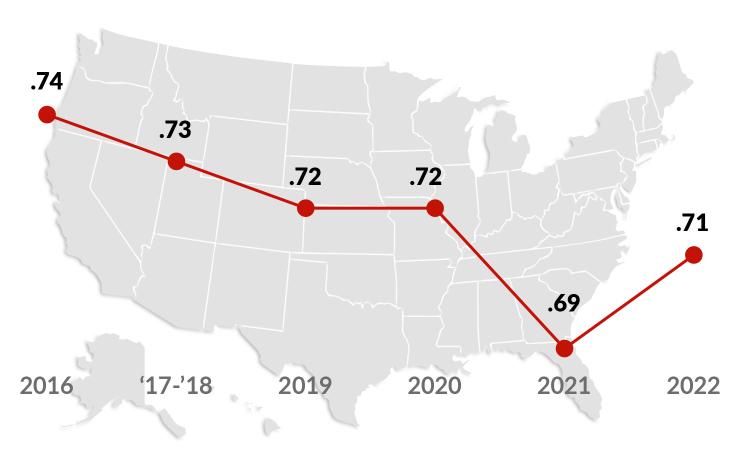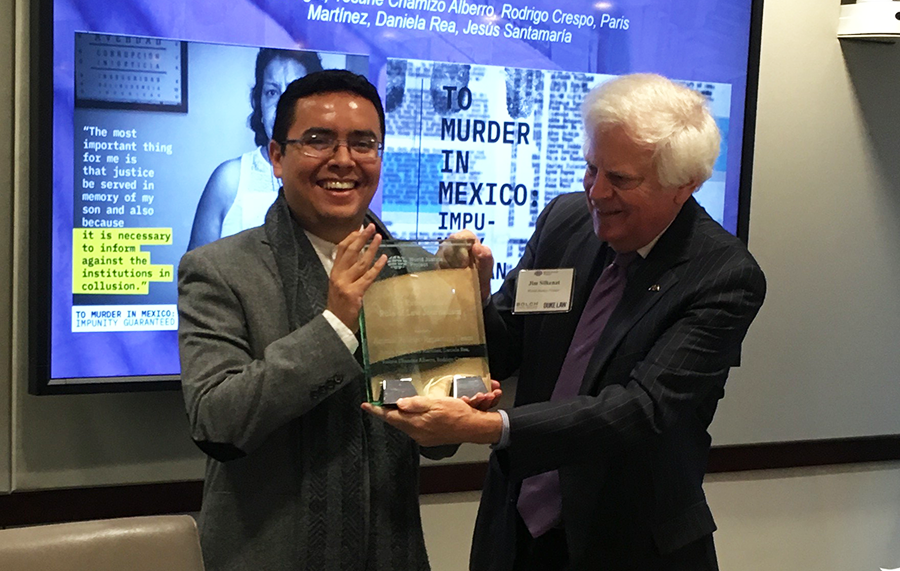

Durham, N.C. (26 October 2018) — The World Justice Project (WJP) today announced the winner of the 2018 WJP Anthony Lewis Prize for Exceptional Rule of Law Journalism. A reporting team from Mexico’s Animal Político are the 2018 prize winners for their investigative reporting series, “To Murder in Mexico: Impunity Guaranteed.” Congratulations to Arturo Ángel, Paris Martínez, Daniela Rea, Yosune Chamizo Alberro, Rodrigo Crespo, and Jesús Santamaría.
The WJP Anthony Lewis Prize for Exceptional Rule of Law Journalism was created to acknowledge journalists from around the world who have contributed to increased awareness and understanding of the importance of the rule of law. The prize was awarded today at WJP’s 2018 Scholars Conference at Duke Law School, “The Rule of Law: Subnational, Supranational, and Empirical.”

The multimedia series from the team at Animal Político documents the large number of homicides that go unsolved in Mexico, highlighting longstanding impunity and a system in which too few victims ever receive justice. In a country that has become one of the most dangerous places to practice journalism, the Animal Político team conducted an eight-month investigation including travel to more than 10 Mexican states.
"It is easy to murder in Mexico without setting a foot in jail. For every 100 cases of murder, only 5 end up with a prison sentence. That is 95% impunity,” said Arturo Ángel, a lead reporter on the series. "This is the sum of how we are living in Mexico."
"Thanks to the World Justice Project for doing what they do, and for giving Animal Político an opportunity to show the kind of journalism that is being done in Mexico."
As one Anthony Lewis Prize judge wrote, “The Animal Político team shows incredible courage...For years, they have been reporting on important rule of law issues, from abuse of human rights to problems in police and judiciary, contributing in making their society better and more efficient. But they are not just covering issues, they are uncovering new important facts.”
The World Justice Project is proud award the 2018 Anthony Lewis Prize to a team that exemplifies the vital role independent journalism plays in the upholding of the rule of law. This work shows us the value of journalists doing what they do best, even against strong headwinds: digging for the truth, and exposing it to the light.
In addition to the prize winners, six journalists were awarded Honorable Mention in recognition of their extraordinary reporting on rule of law issues: Diego Cupolo (based in Turkey); Christian Davies (based in Poland); Alice Driver (based in Mexico); Emily Dugan (of the United Kingdom); Emily Feng (of China); and Kirsten Han (of Singapore).
The WJP Anthony Lewis Prize for Exceptional Rule of Law Journalism was named in honor of Anthony Lewis, a Pulitzer Prize-winning author and journalist, who was a friend and inspiration to the World Justice Project. Mr. Lewis is widely credited with transforming legal journalism in the United States.
Judges for the 2018 Anthony Lewis Prize were:
ABOUT THE WORLD JUSTICE PROJECT:
The World Justice Project (WJP) is an independent, multidisciplinary organization working to advance the rule of law worldwide. Effective rule of law reduces corruption, combats poverty and disease, and protects people from injustices large and small. It is the foundation for communities of equity, opportunity, and peace—underpinning development, accountable government, and respect for fundamental rights. Learn more at: www.worldjusticeproject.org.
MEDIA CONTACT:
[email protected]
(206) 792-7676